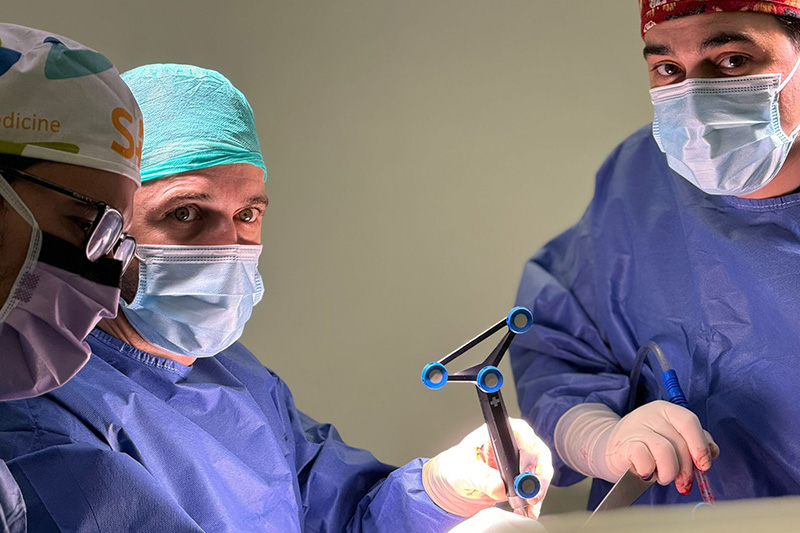
by S0p0rt3 | Jun 4, 2024 | Ribera |
- Ribera is committed to innovation in traumatology with the acquisition of a robot that allows personalised surgery with greater precision.
- No other hospital in the province of Alicante has this technology for Orthopaedic Surgery and Traumatology, which is performed in only a few centres in Spain.
- This programme digitally reconstructs the patient’s knee to provide the surgical team with real-time information on the patient’s anatomy.
The Hospital Universitario del Vinalopó, managed by the Ribera health group, has incorporated robotic surgery in the Orthopaedic Surgery and Traumatology service to implant knee prostheses more precisely, thereby reducing tissue damage. This is the first centre in the province of Alicante to develop this technique in traumatology, which is carried out in only a few hospitals in Spain due to its high level of specialisation. Ribera has opted for this technology that can verify in the same surgical act that the position of the implants is as perfect as possible. This advance means less postoperative pain for the patient, less surgical time, better recovery and greater durability of the implant.
The team of surgeons who have carried out the first interventions, formed by doctors Paulino Sanchez, Emilio Bascuñana and David Fernández, from the Reconstructive Joint Surgery Unit of the Orthopaedic Surgery and Traumatology Service, assures that the application of this technology provides a great leap in quality in the implantation of knee prostheses, since the precision in the placement of the implant is directly related to better mobility, less pain and greater durability. “The assistance of the robot provides us with real-time information to improve the precision of our gestures during surgery,” says Dr. Sánchez.
Robotic-assisted surgery, which has been widely developed over the last few years, represents a turning point in orthopaedic and prosthetic surgery as we know it today, and has become one of the major advances in this field of surgery and medicine in our country.
Innovative technology
This new technique is based on intraoperative navigation technology widely applied in other specialties such as neurosurgery, in this case using specific software for knee prosthesis implants. This programme digitally reconstructs the patient’s knee to provide the surgical team with real-time information on the patient’s anatomy and makes it possible to plan the exact model, size and position of the definitive implant, all digitally as the operation is being performed, thus avoiding having to carry out the different implant adjustment tests that are carried out in traditional techniques. It also allows high-precision automated bone resections, which reduces to a minimum any possible variation between the planned and the final placement of the real implant.
Early recovery and increased durability
Thanks to this technique, patients who have undergone surgery at the Vinalopó University Hospital for a knee prosthesis assisted by robotic navigation have been able to walk with aids on the same day of the operation, thus greatly shortening the recovery period. What’s more, all of them were discharged from hospital without complications within 24 hours. “Reducing tissue damage during surgery is key to avoiding bleeding, pain and making the patient’s recovery much faster and more pleasant, and patients notice this,” explains Dr Bascuñana.
Three-dimensional reconstruction technology using the robotic navigation system helps to reduce tissue injury by allowing only the necessary surgical gestures to be performed and avoids most of the intermediate steps of conventional techniques for implant selection and positioning.
With this system, it is possible to know in advance what the best position will be and to carry out digital dynamic tests to assess how it will behave in the future. All this results in the final implant being placed in the best possible position for the most accurate functioning, which extends the durability of the prosthesis and thus patient satisfaction. “Robotic navigation has meant that we have more information and more precision during surgery. We can now place prostheses that are completely customised for each patient,” Dr Fernández explained.
Customised prostheses
The planning of this state-of-the-art system goes beyond current systems as it not only provides precision to the surgeon, but also allows the definitive implant to be planned based on the type and shape of the patient’s bone, as well as being able to assess the tension of the knee ligaments, a fact that until now had not been possible to evaluate with other planning systems. This allows greater personalisation of the surgery as the implant can be perfectly adjusted to the bone, as well as maintaining the patient’s ligamentous anatomy perfectly intact, thus ensuring that the functioning of the implant is truly balanced, providing greater stability and less discomfort.
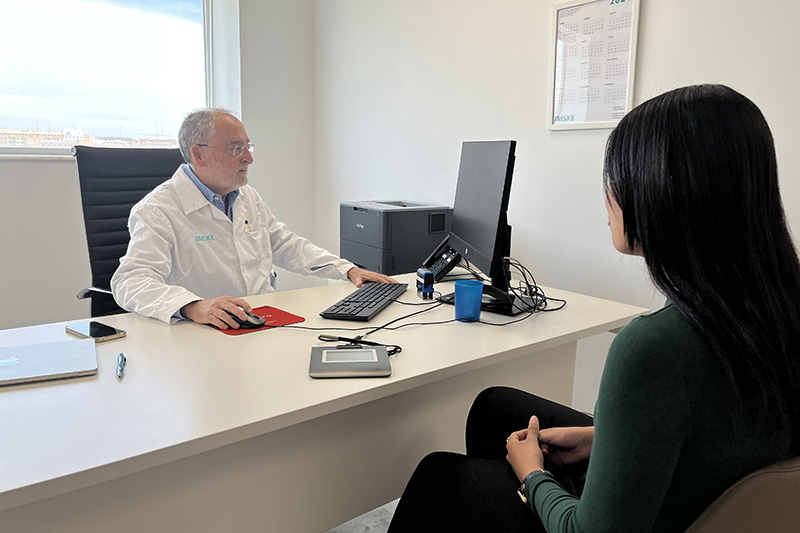
by S0p0rt3 | Jun 4, 2024 | Ribera |
- In the context of World Fibromyalgia Day, specialists remind us that this pathology “generates added suffering for patients, due to the social misunderstanding that is added to the pain, chronic fatigue or sleep problems, among other symptoms they suffer and which can be very disabling”.
- Dr. Palop, who has treated more than 12,000 affected women throughout Spain, has participated in the monographic review of the fibromyalgia disease and the Fisterra Guide and highlights the value of “personalised attention to patients”.
The Ribera IMSKE hospital, the centre specialising in the locomotor system of the Ribera healthcare group, has activated its Fibromyalgia Unit with the incorporation of Dr. Vicente Palop as coordinator of the area, together with Dr. Patricia Roth. Both professionals have extensive experience in the treatment of this syndrome and have been working together for years, forming a professional tandem of recognised prestige in the field of fibromyalgia. Several professionals from Ribera IMSKE have also joined this unit to form a large multidisciplinary team that approaches this disease from all angles: physiotherapy, hydrotherapy, pain, nutrition and rheumatology. This unit also includes Arturo Aleis, nutritionist, and the physiotherapy team made up of Pablo Martínez, Jordi Llopis, and Mariano Soler, who join doctors Palop and Roth in this project, which opens on 8 May, just a few days before the commemoration of World Fibromyalgia Day.
Dr. Palop is a professional with almost 30 years of experience in the treatment of what he defines as “a complex syndrome, which generates added suffering for patients due to the social misunderstanding that is added to the pain, chronic fatigue or sleep problems, among other symptoms they suffer and which can be very disabling”. She has treated more than 12,000 women throughout Spain and has participated in the monographic review of The fibromyalgia disease and the Fisterra Guide on this syndrome, both documents that are considered a reference at a national level and also in South America for the approach to this pathology.
It is estimated that there are around 900,000 people in Spain with fibromyalgia, an ailment that particularly affects women between the ages of 30 and 60, but is also diagnosed in younger people and men. However, according to the National Institute of Statistics, only around 276,000 patients have been diagnosed.
And it is precisely the complexity of this syndrome that makes it difficult to diagnose. Dr Palop explains that patients “have symptoms in different organs, which affects their mood, generates anxiety and even causes cognitive deterioration. “Often, a person with chronic pain does not sleep and is not even able to remember what they have done one day or who they have been with,” explains the fibromyalgia specialist at the Ribera IMSKE hospital.
Dr. Palop explains that at the Fibromyalgia Unit of the Ribera IMSKE hospital, patients undergo a complete assessment and a test to find out exactly what their symptoms are. And then “a personalised and comprehensive approach to treatment is proposed, which may include different specialities, always under the supervision of this specialised unit”. “It is important to remember that these patients have pain without an injury, such as a fracture. But it is fundamentally muscular and tendon pain, which they suffer 24 hours a day, and which has a significant impact on their state of mind, causing anxiety and depression in many cases,” she says, confirming the importance of a comprehensive and multidisciplinary approach.
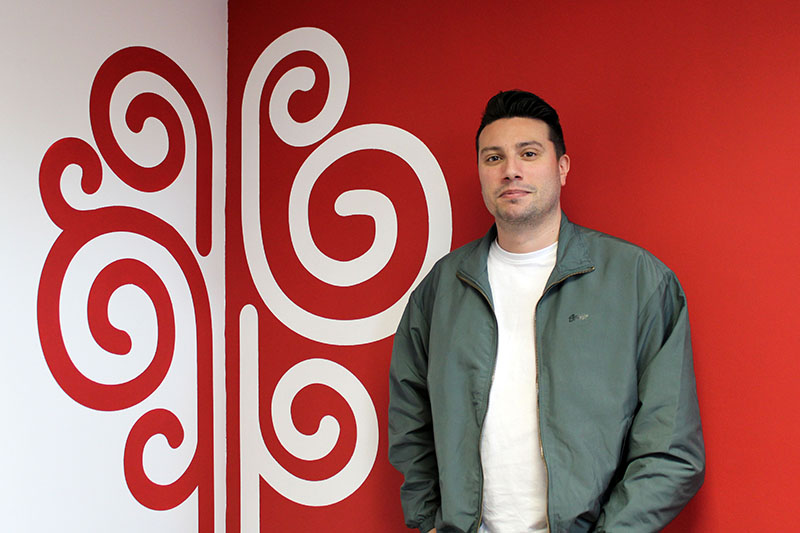
by S0p0rt3 | Jun 4, 2024 | Ribera |
- In the context of World Book Day, Ribera hospitals will decorate some rooms with original texts by this author and influencer, inspired by the importance and value of the care that healthcare professionals provide to patients and their families.
- In addition, five social media posts are planned and bookmarks will be distributed to patients and professionals with their inspirational quotes.
The Ribera healthcare group and the writer Jose Ángel Gómez Iglesias, better known as Defreds, have launched a special collaboration in which the writer from Vigo has created several inspiring texts with which he raises awareness of the importance of care. This campaign, which is launched in the context of Book Day, reinforces the value of literature and writing as therapeutic support, as well as supporting the responsible health model promoted by the Ribera healthcare group for the care of its patients, with special attention to the professionalism of its healthcare workers, humanisation and care.
The collaboration between the Ribera group and Defreds involves the publication of five publications on social networks, which began on Wednesday 24 April with the phrase “The hug that makes you feel at home. The texts created by Defreds for the Ribera Povisa hospital emphasise the value of care, hope, optimism and support, but as usual in the phrases proposed by the Galician creator, they are open to multiple interpretations depending on the sensitivity of the reader or his or her personal life moment.
The collaboration project has transcended the social networks with different media in Ribera hospitals. On the one hand, the phrases created by Defreds have been reproduced on a physical medium and can now be read in different areas of the group’s health centres, such as waiting rooms, extractions, dialysis units and the day hospital.
In addition, on the occasion of Book Day on 23 April, the Ribera hospitals have distributed bookmarks, in which one of Defreds’ phrases is reproduced, among the patients and professionals in each centre to reinforce the campaign.
The collaboration with Jose Ángel Gómez reinforces the Ribera health group’s commitment to creativity, to add value to its brand, as well as its intention to reach a greater number of people, including young people, and thus contribute to raising awareness of the importance of resorting to official health sources to access reliable health information, from authoritative voices with specialised training.
Recently, the Ribera health group has also collaborated with the designer 72 kilos on the occasion of Health Day, and last year it launched the Rhythms of Life campaign, which combines music and cardiovascular health, and which has already received several awards and distinctions.
Mobile libraries in hospitals, poetry reading and storytelling
The Ribera hospitals have organised a multitude of activities in the context of Book Day, such as the storytelling day at the University Hospital of Torrejón or the poetry recital, accompanied by music, which took place at the University Hospital of Vinalopó. The Cascais Hospital (Portugal), for its part, organised a special day as part of its collaboration with an association of volunteers who read books to children in hospital.
In addition, the university hospitals of Vinalopó (Elche) and Torrejón, the Ribera Povisa hospital (Vigo) and Ribera Hospital de Molina have mobile library services to provide their patients with access to readings that help to improve their physical and emotional well-being, as well as to make their waiting time or admission to day hospital, hospitalisation or dialysis, among others, more pleasant. They also have several fixed points, small libraries, in services such as paediatrics and waiting rooms, psychiatric hospitalisation and emergency observation, among others, depending on the health centre.
Vinalopó and Torrejón launched the initiative based on the donation of books by the professionals of the health centre itself, while in the case of Ribera Hospital de Molina, the project was made possible thanks to the donation of funds from the Municipal Library Network of Molina de Segura.
Video collaboration Defreds Video: https://www.instagram.com/p/C6LhNAviKT9/

by S0p0rt3 | Jun 4, 2024 | Ribera |
- The health group and Óscar Alonso reflect in six characteristic vignettes of the artist the value of betting on professionalism, prevention, humanisation and technology to improve the welfare of citizens.
- In addition to the publication on social networks, Ribera hospitals will decorate some rooms with the drawings that 72 kilos has made exclusively for the group.
The Ribera healthcare group and illustrator Óscar Alonso, better known as 72 kilos, have carried out a special collaboration on the occasion of World Health Day, which has involved the design of six of the artist’s characteristic cartoons on health care and wellbeing. The aim of this collaboration is to “give shape and colour” to the responsible health model that the health group promotes for the care of its patients, with some of its most characteristic values: professionalism, humanisation, prevention and technology.
The vignettes created specifically by 72 kilos for the Ribera health group to mark World Health Day were published on Sunday on the social networks of both groups and will be used in the coming months in different actions related to health promotion with patients. “Your health is a great responsibility”: “Take care of it at all stages of life”; “look for the way to prevent diseases”; “to take care of your health, surround yourself with good hands and the best technology”; “let yourself be accompanied with affection and humanity”; “I take care of you and you take care of me” are some of the phrases used, which are accompanied by drawings and cartoons, with the hallmark of the well-known illustrator, with more than 2.4 million followers on Instagram alone.
This collaboration with 72 kilos confirms the Ribera group’s commitment to creativity to add value and notoriety to its brand, but above all to give a more original approach to health advice and thus reach a greater number of people, including young people, and the importance of these health tips being endorsed by health professionals. Prior to this collaboration, Ribera has received several awards and recognition for the Ritmos de Vida campaign, which unites music and cardiovascular health, and for Hablemos del suicidio and its “en blanco” campaign, to raise awareness of the importance of talking about this problem.
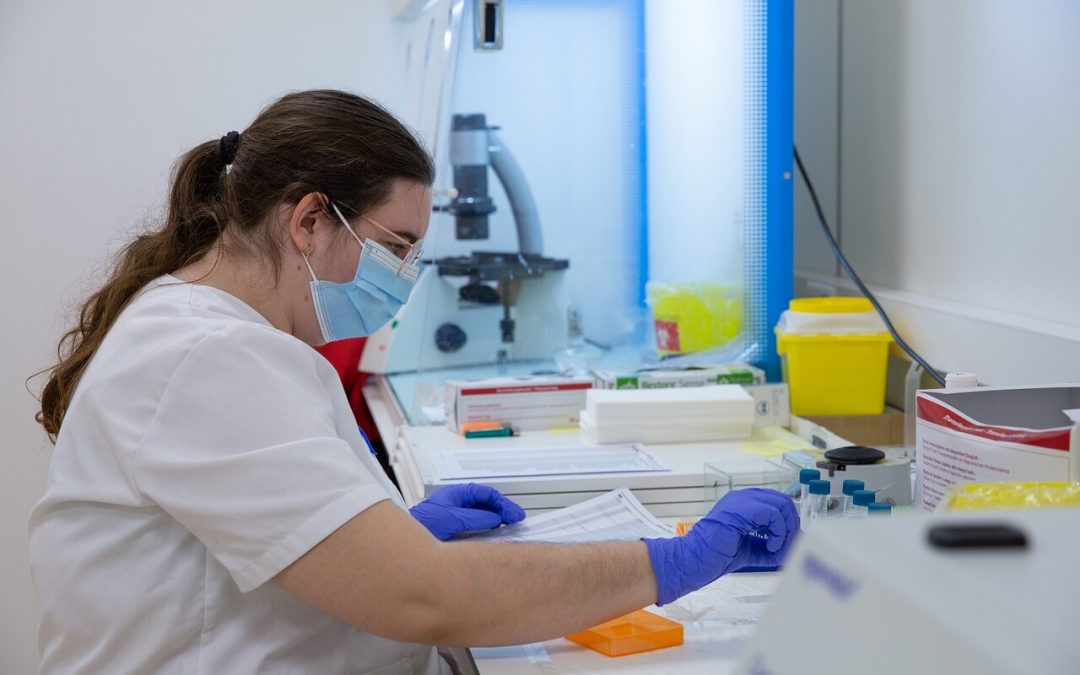
by S0p0rt3 | Jun 4, 2024 | Ribera |
- In the context of World Colon Cancer Day, which is commemorated next Sunday, the laboratory division of the Ribera Group insists on prevention.
- A liquid biopsy can avoid, in some cases, tests such as faecal occult blood tests or colonoscopy, which are more invasive for the patient.
Colorectal cancer is one of the most commonly diagnosed tumours in Spain. Moreover, as it is a silent cancer that in its early stages does not present characteristic symptoms, it is often detected in advanced stages. For this reason, in the context of World Day against colon cancer, which is commemorated next Sunday, the laboratory division of the Ribera healthcare group reminds us that progress in early detection is fundamental for the evolution and better prognosis of these patients.
Ribera Lab, the laboratory division of the Ribera healthcare group, has added Prevecol, a blood test developed by the biotechnology company Amadix, to its portfolio of services, whose main objective is to advance the diagnosis of colorectal cancer. One of its main advantages is that the test only requires the extraction of a blood sample and can replace the technique for detecting occult blood in faeces. This test is aimed at asymptomatic people between 50 and 75 years of age and can detect early stages of colorectal cancer and precancerous lesions.
In the United States, for example, 60 per cent of colorectal cancer cases are detected at advanced stages. “Late diagnosis is directly related to a worse prognosis and poorer survival. The PreveCol test allows us to detect early stages of colorectal cancer, which means a better prognosis for patients, as we know that early stage diagnoses increase survival by up to 90 percent,” say Ribera Lab’s management.
To date, the method used in colorectal cancer screening programmes is the faecal occult blood test (FOBT). However, in addition to the discomfort it can cause to those who undergo it, the faecal occult blood test is less able to detect early lesions than the PreveCol test. Therefore, among the main advantages offered by PreveCol to users are that it is non-invasive, convenient and facilitates the process, avoiding colonoscopy in some cases and thus reducing the discomfort for patients.
Early detection remains a challenge, resulting in late diagnosis and less favourable patient outcomes. Blood testing offers an innovative solution to this problem.
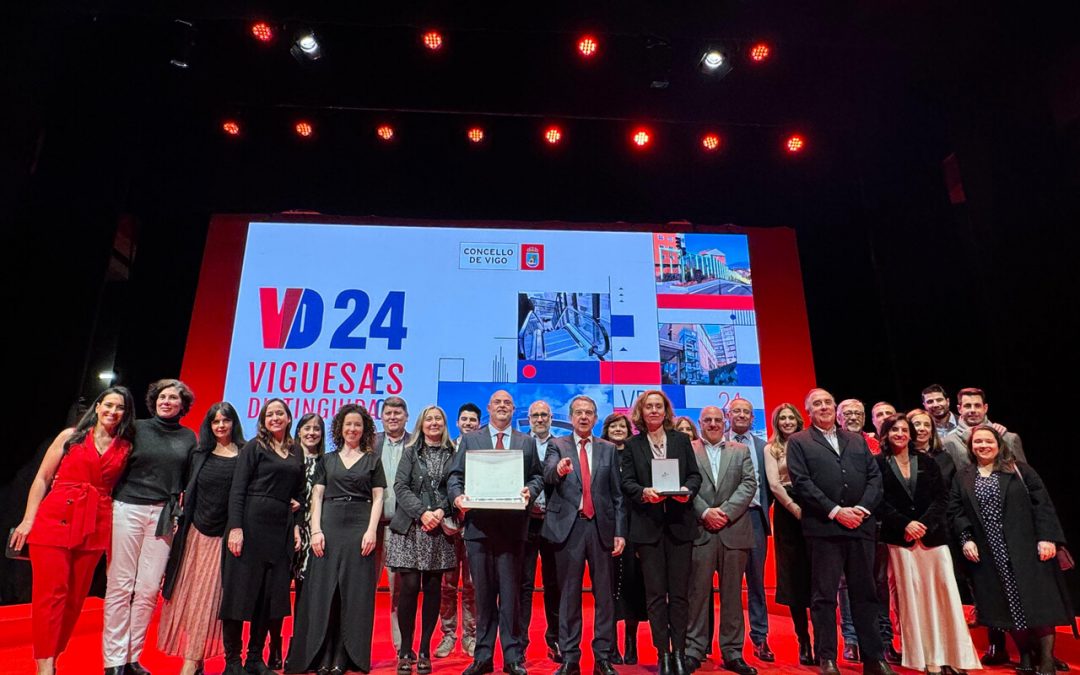
by S0p0rt3 | Jun 4, 2024 | Ribera |
- The president of the Ribera Group, Alberto de Rosa, receives this prestigious distinction at the Distinguished Vigoians gala and thanks all the professionals for their professionalism, passion and dedication “in this great health and social project, which was born by and for the citizens of Vigo”.
- The mayor of Vigo, Abel Caballero, pointed out that the Ribera Povisa hospital was distinguished for protecting and preserving people’s health, for the 1,300 workers who work there and for more than 50 years looking after our health”.
The Ribera Povisa Hospital received yesterday the Gold Medal of the city of Vigo, at the Gala of Distinguished Vigueans, in recognition of its contribution to the quality of health care in the area throughout its 50 years of history. The event was held at the Afundación Theatre in the afternoon, which welcomed representatives of Vigo society and Galician institutions, as well as professionals from the hospital itself and the Ribera Group.
The president of the Ribera health group, Alberto de Rosa, received the award from the mayor of Vigo, Abel Caballero, and thanked the mayor for this special recognition “on behalf of all the professionals who are and have been part of Povisa”. “I am very proud and excited to represent this great health and social project, which was born by and for the citizens of Vigo,” he said. “We citizens believe that a hospital is the place where we receive healthcare when we are ill. But Ribera Povisa is much more. Because they look after your health, but they also look after you, your wellbeing. Just as families do. Because Ribera Povisa is a family. They have formed a great family of which all the people of Vigo feel part and proud”, he added. De Rosa also stressed that Povisa has always been “a pioneer in a unique model of collaboration between civil society and the administrations, so that the residents of Vigo have access to the best possible health care”. “Povisa was born to complement the city’s healthcare, in a structural way, leading a unique project,” he explained.
For his part, the mayor of Vigo, Abel Caballero, pointed out that the Ribera Povisa hospital was distinguished “for protecting and preserving the health of the people who come to the hospital every day, for the 1,300 workers who develop their professional careers there and for more than 50 years looking after our health”.
The City Council of Vigo announced the award of the Gold Medal to the Ribera Povisa hospital last December, during the institutional act in which the health centre celebrated its 50th anniversary. “Ribera Povisa is an essential hospital for this city and we want to pay tribute to it as a health institution that is committed to excellence and quality,” said Mayor Abel Caballero on that occasion. “Povisa plays a fundamental role in the health and employment of Vigo and provides great health care to thousands of Vigueans.
The Gold Medal is the highest award given by the City Council of Vigo to individuals, groups or entities for their merits in the service of the city and its metropolitan area in any aspect of social, cultural, sporting or economic reality. The distinction has its origins in 1936 and was awarded occasionally until 1987, when it began to be awarded annually, in the days prior to 28 March, the day of the local feast of the Reconquest. Among the institutions recognised over the years are the University of Vigo, the Real Club Celta de Vigo, the AECC and the automobile industry, among many other illustrious personalities. This year, Ribera Povisa receives the award together with the National Police, which celebrates its 200th anniversary.
The Ribera Group’s CEO, Elisa Tarazona, the managing director of the Ribera Povisa hospital, Ángela Guerra, and the care director, Sonsoles Leal, as well as Javier Atanes, managing director of the other two centres that the Ribera Group has in Galicia (the Ribera Juan Cardona hospital, in Ferrol, and the Ribera Polusa hospital, in Lugo), among other Ribera Group professionals, attended the gala of distinguished Vigo residents.







Recent Comments